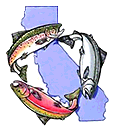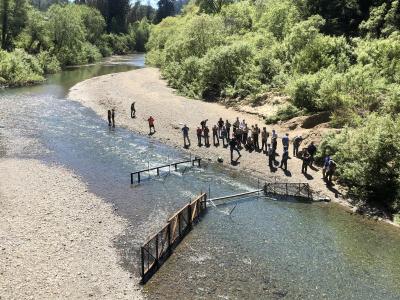Holding Space—Restoring Habitat and Making Room for Innovation
March 26 - 29, 2024
Community Outreach, Collaboration Tools, and Tribal Engagement Workshop
26 March 2024
9:00am - 5:00pm
Workshop Coordinators: Kristen Wright, National Policy Consensus Center, Portland State University; Leslie Wolff, NOAA Fisheries, West Coast Region; Mary Burke, California Trout North Coast Program Manager; and Robin Hoffman, Cultural Resources Program Manager, and Jason White, Engineer, Environmental Science Associates
This workshop built participants knowledge and personal tools for collaborative success. The tools and practice sessions with case studies deepened participants understanding of the “science of collaboration.” Participants also developed a greater understanding for the role and mechanics of trust-building and what strategies can be implemented to build trust and reach durable agreements that lead to on-the-ground successful restoration. Kristen Wright, NPCC Director of Training and Academic Services, has designed customized collaborative training for salmonid restoration practitioners. The workshop included two training modules, including a mix of presentation, discussion, and participatory exercises grounded in examples from the North Coast of California.
Specifically, part one focused on the Fundamental Dynamics and Principles of Collaboration and provides a framework for evaluating and improving collaborative efforts with an eye toward creating mutually satisfying outcomes for involved parties. Participants left with a better understanding of a framework for developing mutual agreements and the impact and role that trust and social learning play in building effective agreements and lasting implemented solutions. Plus, each participant had the opportunity to apply these principles to an actual case.
Part two focused on Personal Tools for Collaborative Success. This session provided three specific personal tools that participants were able to immediately apply to their partnerships and collaborative settings. These skills and behaviors are research-based highly effective techniques for building trust, creating better working relationships, improving group deliberation and decision-making, and eliciting more collaborative behavior from others.
The afternoon session focused on providing the regulatory background for tribal consultation, highlighting the benefits of tribal engagement early in project development, providing best practices/processes for tribal engagement, and reviewing multiple case studies that address these issues. The session included round-table and panel discussions, as well as presentations, with the aim to provide project proponents, sponsors, and agencies with additional tools to develop and implement approaches to successful tribal engagement and project design/implementation.

